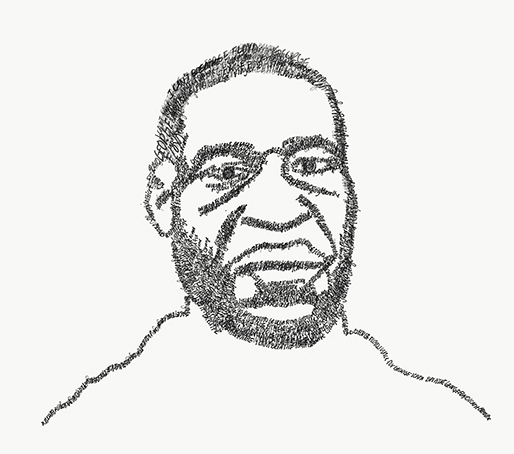
The CREATE! Micro-Grant Program supported the launch of 12 student projects that analyze and respond to racial injustice and the struggles brought on by the ongoing COVID-19 pandemic. These projects, ranging from interpretive dance and musical performances to traditional Anishinaabe quill work, videos, podcasts, personal essays, and poetry, can now be viewed online through the CREATE! Micro-Grant Virtual Exhibit.
“What you will see is artists and writers facing their struggles head on, in form and content,” said Divya Victor, Associate Professor of Creative Writing and Transnational Poetry, who organized the competition. “What you will see is young change-makers using their art, music, materials, and language to pull themselves out of the pit of darkness and find their way through the riot of feeling within them. A riot that is within many of us.”

The CREATE! Micro-Grant Program jury selected 12 student project proposals to each receive $500 in funding. The winners then used the money to undertake their projects, which engaged in a variety of expressive mediums portraying messages about the ongoing COVID-19 pandemic. Many of the winning projects also reflected on the fight for social justice in the Black Lives Matter movement by producing art that responds to struggles brought on by the pandemic and acts of police brutality.
The following are the 12 student projects that received CREATE! Micro-Grant funding and that are featured in the online exhibit:
Jason Dernay, senior Fine Arts in Acting and Arts Management double major, and Nate Davis, junior Acting major, created a 10-episode podcast where they interviewed multiple artists and discussed how the pandemic has affected them and the art industry.

Hugh Downs, sophomore Jazz Studies Performance major, showcased his original Jazz performance, Here We Go Again, to provoke critical reflection during the pandemic and to invoke healing.
Paula Duva-Rodriguez, junior Vocal Performance and English Literature double major, created a combination of poetry and images of her body, titled In Process, to represent mental illness in the time of a pandemic.
Jack Huber, junior Integrative Biology major, created a personal essay discussing the loss of his grandmother during the pandemic and the social value of funerals.
Devin McKinney, senior Media and Information major, and Donte Smith, senior Film Studies major, created a video project that addresses how the pandemic has affected the Black community, particularly in the Detroit metro area, as well as how the public consumes media.
Jake Gerard Price, junior Arts and Humanities major, performed a contemporary dance, titled Fractures & Folds, set to Nils Frahm’s track “Less” to portray the embodied and social impact of the virus.

Marshall Ross, junior Acting major, created a film that follows a man alone in isolation during the lock-down order, highlighting the effects of anxiety/depression.

Marissa Rubaiai, junior Studio Art and Media and Information double major, created an art installation of three human forms that each tell a story about death suffered at the hands of COVID-19 and police brutality.

Lauren Slawin, freshman Creative Advertising and Graphic Design double major, produced a video documenting the creation of a portrait of George Floyd to bring light to racial discrimination.

Emma Stoolmaker, junior Art Education major, created a large-scale collaged postcard addressed to Rome, Italy, to invoke communication and sensitivity during the pandemic, as well as acting as a tribute to a city that suffered greatly.
Sarah Whitaker, sophomore Percussion Performance major, combined prose, music, soundscape, and writing to push the boundaries of comfort in relation to the pandemic and writing to document the positive yet complex impacts of virtual learning on self-image and the healing of traumas caused by microaggressions and anti-Black racism in institutions of higher education.”
Jenna M. Wood, senior Apparel and Textile Design major, created a mask using traditional Anishinaabe quill work as a tribute to the smallpox outbreak that occurred in her tribe, the Little Traverse Bay Bands of Odawa Indians.

The CREATE! Micro-Grant program was made possible through the collaboration of the Michigan State College of Arts & Letters and the Dean’s Arts Advisory Council, with the support of several departments within MSU, including the Associate Provost for Undergraduate Education; Center for Interdisciplinarity; College of Arts & Letters; Department of Art, Art History, and Design; Department of English; Department of Theatre; Film Studies Program; Honors College; and the Residential College in the Arts and Humanities.

“The members of the Dean’s Arts Advisory Council are all artists, writers, filmmakers — we all have living arts practices that are helping us get through this difficult time,” Victor said. “We knew that supporting student arts and literary practice through the pandemic, even in a small way, would affirm the practical and emotional purpose of art-making, which is to clarify, document, and intervene into global situations in our own particular ways.”
Written by Alec Parr


